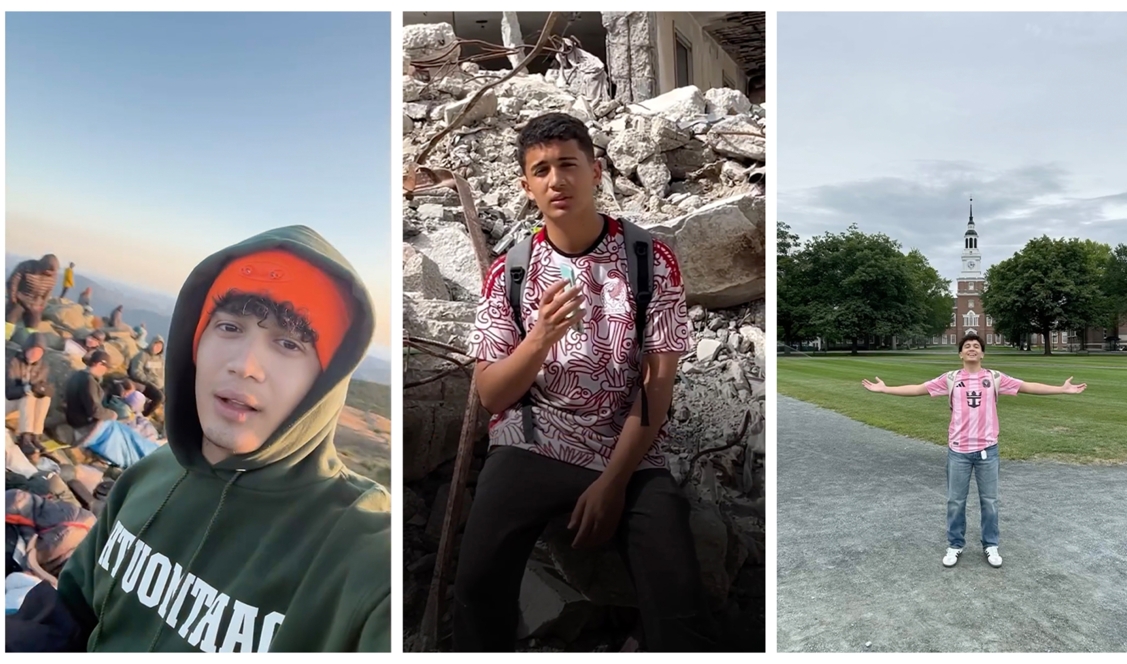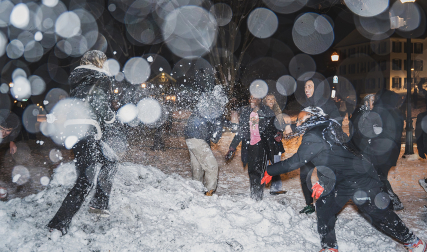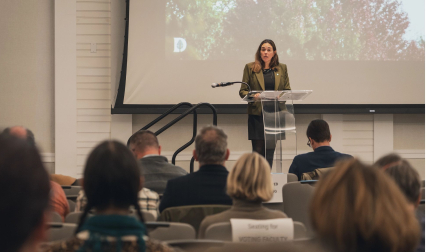Omar Rashid was living in central Gaza’s sprawling Nuseirat refugee camp with his mother and two brothers on New Year’s Eve 2023. Late in the evening, Omar heard missile strikes in the distance from the Israeli invasion that had driven his family from their home in Gaza City. But the deadline for the college Common Application was hours away, and Omar had no time to waste. He had essays to finish and an application to submit.
Omar had never been to Dartmouth, or the United States, but he had spent years researching American colleges with friends. He dreamed of ivy-covered brick and New England foliage. Now, Omar needed the internet to make that dream come true. The nearest place his eSIM worked was 12 miles away at the Egyptian border. The only way there was to walk through a war zone.
Omar’s mother forbade him from going, saying it wasn’t worth her middle son’s life to apply to college. But Omar had grown up with the knowledge that education could be his ticket to a different life. His mother, who graduated from Gaza’s Al-Aqsa University with a degree in journalism, worked with nongovernmental organizations before the war. Now, amid the fighting, she has to scrounge for what little work she can find. An American college would provide Omar with new opportunities. So, he snuck out.
Missiles hit the streets not far from where Omar walked, and he made his way through rubble as far as possible. The fighting had ebbed since earlier in the evening, but Omar knew more missiles could fall at any minute. He had to turn back.
“Thankfully, I didn’t go very early,” when the bombing was more intense, Omar says now, which “would have been much worse.” But the walk back home was painful, knowing that he would not be submitting his college application that year. When he arrived, Omar found his mother in tears. “I promised her that I wouldn’t apply,” he recalls.
So began Omar’s extraordinary journey from a war zone in the Middle East to the woods of New Hampshire. After Hamas launched its surprise attack on Israel on October 7, 2023, the Israeli military’s subsequent invasion forced most Gazans to flee their homes to escape the destruction. Like everyone else, Omar worried about finding food and shelter for his family, but he never let go of his American dream.
At first, Omar’s family held out hope that Israel and Hamas would soon announce a ceasefire—the nations agreed to a brief one in November 2023—and that peace would come to the Gaza Strip. They could return home and rebuild. Omar could apply to colleges.
“We would all think that this is the last year,” Omar says, “but the sad reality is that nothing changes, except for the worse.” A year later, as Dartmouth’s November 2024 early-decision deadline approached, Omar was determined to submit his application to the College. He wanted to do more than survive daily life in a war zone; he wanted to make a new future for himself. This time, he worked with a family friend to revise an old application that had been rejected in 2022, before the war. When he was done, Omar traveled back to the Egyptian border and hit submit.
On December 13, 2024, Dartmouth College welcomed Omar Rashid to the class of 2029, to eventually join 1,205 classmates. Omar was overjoyed, but now he had an even bigger problem: How would he get out of Gaza when even people with life-threatening injuries struggled to obtain evacuation permits? As the months wore on and crossings out of Gaza remained closed, Omar began to get discouraged that he would ever get to campus in the fall of 2025.
In April 2024, Omar and his friend Mohammed Herzallah had started the Instagram account @omarherzshow to document in English their daily lives in Gaza. Omar started the account—whose bio reads, “two friends are in an adventure amidst the war”—to escape the intense boredom of life in a refugee camp. Mohammed lived in a neighboring tent, and while the boys scrounged for work in the local market or a nearby cafeteria, they still had abundant downtime to fill. Internet reception in the camp was so poor, however, the pair killed a lot of time walking back and forth to the Egyptian border to upload clips.
Omar and Mohammed’s videos present two young men trying to find some normalcy in an extraordinarily bad situation. They look for soccer balls to start a pickup game. They crawl through ruins. They play chess. They film lines of refugees. They goof off in the sand. They splice jokes and clips of kids trying to do flips at the beach with explosions and scenes of collapsed buildings. They survive in whatever ways they know.
“The mainstream media would always show the horrible things that have always been in the news,” Omar recalls. “It’s very important for the outside world to see what’s going on, but as someone living in this situation, we weren’t very interested in [reliving] what we see in real life.” They recorded in English to avoid discovery on the social media algorithms of Arabic-speaking friends and family, conscious that parents might disapprove of the potential danger in public exposure. But the plan to keep their posts under the radar backfired as their “day in the life” videos went viral.
The Instagram account had other benefits for Omar as he connected with fellow ’29s via online group chats. Every night before bed, Omar opened YouTube and watched all the pre-downloaded Dartmouth videos he could find, from dorm tours to Food Court (FoCo) reviews. Members of the Dartmouth community rallied around his dream. Working with the Dartmouth Palestine Solidarity Coalition, Lila Li ’29 and others began a Change.org petition titled “Bring Omar to Dartmouth.” The petition, which urges the College’s board of trustees to act on Omar’s behalf, collected more than 40,000 signatures in a few months. Omar began to hope for an unlikely future.
In mid-May 2025, Omar received a call from a humanitarian agency. He still doesn’t know what group reached out, but the volunteer on the other line informed him that its most recent list of people to evacuate from Gaza included his name. Omar had to immediately prepare for the journey to a hospital in Khan Younis, which lay in a “red zone” marked by heavy violence. Entrance required explicit permission from the Israeli military—permission that he did not have in writing. Omar hesitated to leave his family, but his older brother, Ashraf, convinced him that the risks were worth it. His mother did not stand in the way. “I really respect my mom for letting me go,” says Omar, knowing she worried intensely that something terrible might befall him.
Omar made it to the hospital and spent a sleepless night surrounded by humanitarian workers, listening to the sound of missiles outside. At one point, the building’s exit was damaged, and he feared he would be trapped inside. Volunteers eventually cleared the doorway, but then a bomb decimated the bus Omar intended to take to the Karam Abu Salem crossing out of Gaza. He eventually got a seat in an emergency vehicle that shuttled him to the crossing. Omar spent two months in a refugee camp outside of Gaza while he applied for a student visa to the United States.
Finally, on August 18, Omar boarded a commercial flight to Boston. At Logan Airport, he stepped onto the Dartmouth Coach and began the last leg of his three-month journey to Hanover. As the bus headed up I-89, winding through mountains and pine trees, he could finally believe that the dream he nurtured for so many years was about to come to fruition. “It really felt as though this is the place that I always wanted to be but even more beautiful,” he says. “I’m enjoying every moment.”
And Omar is in good company. Despite the Trump administration’s restrictions on visas, all of Dartmouth’s international students made it to school this year without diversion.
Between first-year trips, FoCo cookies, and club soccer tryouts, Omar has embraced life in Hanover. The hardest adjustment has been separation from his family and the knowledge they remain stuck in Gaza. He tries to speak with them as often as possible and send money when he can. Now that the two sides have agreed to a ceasefire, Omar can breathe a little easier since the shooting has mostly stopped.
Despite the vast differences between Dartmouth and Gaza, Omar has found one similarity between the woods of New Hampshire and his home city more than 5,000 miles away. In the apartment block where he grew up, “Everyone [knew] everybody. Our cousins were our neighbors. Home was always an outlet where we would gather as a family.” The tight-knit community at Dartmouth feels a little bit like home, he says. “In Dartmouth, you always find your community. I’ve made a lot of good friends …. It’s been marvelous so far.”
Margot Ruland is a DAM editorial intern.





